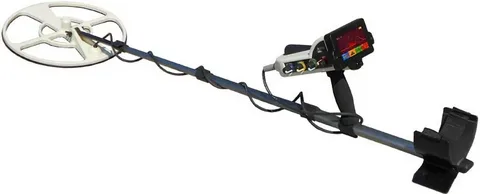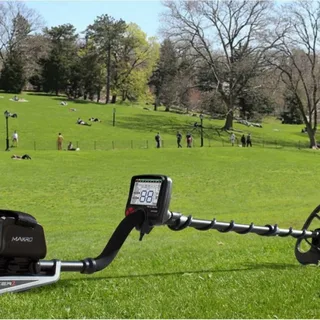Metal detectors have long been used to uncover hidden treasures buried beneath the earth's surface. In 2021, the top metal detectors continue to be essential tools for treasure hunters, historians, and hobbyists searching for valuable artifacts and relics. With advancements in technology, these devices have become more efficient and accurate in detecting metal objects. In this article, we will explore the top metal detectors of 2021 and their features that make them stand out in the market. Whether you're a seasoned treasure hunter or a beginner in the field, these metal detectors are sure to help you uncover hidden treasures.
Uncovering Hidden Treasures: The Top Metal Detectors of 2021 is a comprehensive guide that reviews and compares the best metal detectors on the market. It includes information on features, performance, durability, and price to help consumers make an informed decision when purchasing a metal detector. The guide also provides tips and advice on how to use metal detectors effectively and maximize the chances of finding valuable items. Whether you're a beginner or an experienced treasure hunter, this guide has something for everyone looking to explore the world of metal detecting.
The Top 10 Metal Detectors for Beginner Treasure Hunters

Are you interested in uncovering hidden treasures and artifacts? Metal detectors are a valuable tool for discovering metal objects buried beneath the ground. Whether you're an amateur treasure hunter or a seasoned enthusiast, a quality metal detector can help you locate coins, jewelry, and historical relics. By understanding how metal detectors work and employing the right techniques, you can maximize your chances of finding valuable items during your explorations.
1. Garrett Ace 300 2. Fisher F22 3. Teknetics Eurotek Pro 4. Minelab X-Terra 305 5. Bounty Hunter Land Ranger Pro 6. Nokta Makro Simplex+ 7. Whites TreasurePro 8. Tesoro Compadre 9. XP Deus 10. Minelab Vanquish 340
Understanding the Science Behind Metal Detectors
See also: metal detectors for treasure hunting

Metal detectors operate on the principle of electromagnetic induction. When a metal object comes into contact with the electromagnetic field produced by the detector, it creates eddy currents within the metal. These eddy currents produce their own magnetic field, which interferes with the original electromagnetic field of the detector. This disturbance is then detected by the device, setting off an alert to the operator. The size, shape, and conductivity of the metal object will influence the strength and duration of the eddy currents, which in turn affects the signal detected by the metal detector. This is why different metals can produce different responses when passed through a metal detector. Metal detectors are commonly used in security screenings, archaeological excavations, and mining operations. They are a valuable tool for locating buried metal objects and ensuring safety in various environments. Understanding the science behind their operation can help users better interpret the signals they receive and improve the effectiveness of their searches.
How to Use Metal Detectors to Find Buried Treasure

When using a metal detector to find buried treasure, it's important to first research the area where you plan to search. Look for historical maps, records, or local legends that may indicate potential treasure sites. Once you've chosen a location, adjust your metal detector's settings according to the terrain and potential depth of the treasure. Start sweeping the area in a grid pattern, moving the detector slowly and listening for any beeps or signals indicating metal below the surface. When a signal is detected, use a shovel or digger to carefully unearth the object, being mindful of any valuable or fragile items that may be buried. Always obtain permission from the property owner before searching, and be respectful of the land and any artifacts you may discover.
The Best Metal Detectors for Beach Hunting

The best metal detectors for beach hunting are typically those that are waterproof, as they are designed to withstand the wet and sandy conditions typically found at the beach. Look for a metal detector with a high frequency range, as this will better detect small and fine jewelry items that are often buried in the sand. Additionally, a metal detector with discrimination settings can help filter out unwanted targets, such as iron or aluminum, allowing you to focus on valuable finds. Other features to consider include adjustable sensitivity, multiple search modes, and a lightweight and ergonomic design for comfortable use over long periods of time. Some popular models for beach hunting include the Minelab Equinox 800, Garrett AT Pro, and Fisher F22.
Tips and Tricks for Maximizing Your Metal Detector Finds
Here are some tips and tricks for maximizing your metal detector finds: 1. Research and scout out potential locations before heading out with your metal detector. Look for areas with a history of human activity, such as old houses, picnic areas, beaches, and parks. 2. Use headphones while metal detecting to block out background noise and better hear the signals from your detector. 3. Swing your metal detector coil at a steady pace, keeping it close to the ground and overlapping your swings to ensure thorough coverage of the area. 4. Learn how to interpret the sounds and signals your metal detector gives off to distinguish between different types of metals. 5. Dig carefully and use a good quality shovel or trowel to avoid damaging any items you may find. 6. Consider investing in a pinpointer to help locate targets more accurately and speed up the recovery process. 7. Stay patient and persistent – treasure hunting with a metal detector can be a waiting game, but the thrill of finding something valuable makes it all worthwhile.
The History of Metal Detectors: From War to Hobby
The history of metal detectors dates back to the early 20th century, when they were primarily used for military purposes. During World War II, metal detectors were used to locate landmines and other explosive devices, saving countless lives on the battlefield. After the war, metal detectors began to be used in a variety of industries, including mining, construction, and archaeology. They became an essential tool for finding buried metals and artifacts, as well as for security purposes in airports and public buildings. In the 1960s, the popularity of metal detectors began to grow among hobbyists and treasure hunters. Companies started manufacturing metal detectors for recreational use, leading to the emergence of metal detecting as a popular hobby. Today, metal detecting has become a widespread pastime, with enthusiasts searching for coins, jewelry, and historical artifacts in parks, beaches, and other public areas. The technology has also continued to evolve, with advanced features and capabilities for both hobbyist and professional users.
Metal Detecting Laws and Regulations: What You Need to Know
Metal detecting laws and regulations vary depending on the location, as different countries, states, and local authorities have their own rules regarding metal detecting. In general, it is important for metal detector enthusiasts to research and understand the specific laws and regulations for the areas they plan to explore. This may include obtaining permission from private landowners, adhering to restrictions in public parks and protected areas, and following any archaeological preservation laws. Additionally, some areas may require a permit or license for metal detecting. It is essential to be aware of and comply with these regulations to avoid legal issues and ensure responsible metal detecting practices.
The Benefits of Metal Detecting as a Hobby and Exercise
Metal detecting can be a fun and rewarding hobby that also offers a great form of exercise. It allows enthusiasts to spend time outdoors, exploring different environments, and staying physically active. The act of swinging a metal detector and digging for buried items can provide a full-body workout, as well as improve hand-eye coordination. Additionally, the excitement of potentially finding valuable items or historical artifacts can add an extra thrill to the activity. Overall, metal detecting as a hobby can contribute to both physical and mental well-being.
The Pros and Cons of Different Types of Metal Detectors
Pros and Cons of Different Types of Metal Detectors: VLF (Very Low Frequency) Detectors: Pros: - Good at detecting small metal objects - Can discriminate between different types of metals - Suitable for general purpose metal detecting Cons: - Less effective in highly mineralized soils - Can be sensitive to electromagnetic interference Pulse Induction (PI) Detectors: Pros: - Effective at depth detection - Less affected by mineralized soils - Suitable for detecting larger metal objects Cons: - Less accurate in discriminating between different types of metals - Can be heavier and more expensive Beat Frequency Oscillation (BFO) Detectors: Pros: - Simple and easy to use - Affordable for beginners Cons: - Less effective at depth detection - Limited discrimination capabilities Multi-Frequency Detectors: Pros: - Can operate on different frequencies for better detection capabilities - Good at discriminating between different metal types Cons: - Can be more expensive - May have a steeper learning curve for beginners
Maintaining and Caring for Your Metal Detector: A Comprehensive Guide
Maintaining and Caring for Your Metal Detector: A Comprehensive Guide provides detailed information on how to properly clean, store, and maintain your metal detector to ensure optimal performance and longevity. The guide covers essential maintenance tasks such as cleaning the search coil, control box, and shaft, as well as how to protect your metal detector from damage during use and storage. Additionally, it offers tips on troubleshooting common issues and replacing worn-out parts. This comprehensive resource is a valuable tool for metal detector enthusiasts looking to keep their equipment in top condition.
